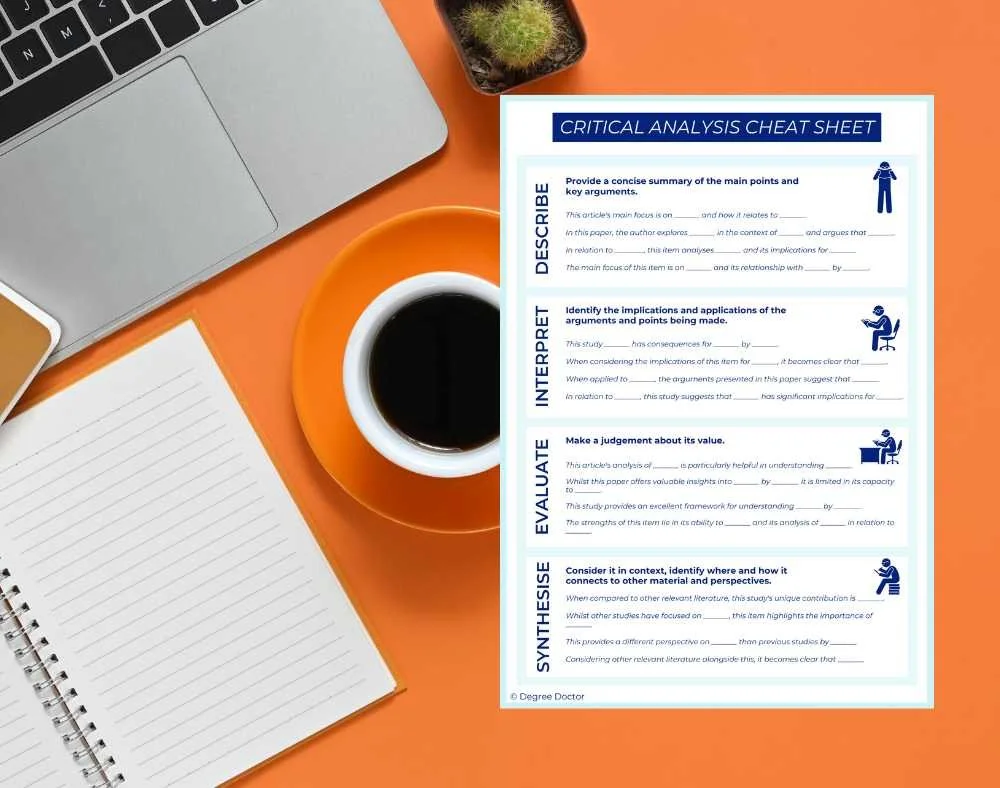How can I be more critical in my dissertation literature review?
How can you be more critical in your dissertation literature review?
Have you ever received feedback on your masters degree or PhD literature review that you need to be more critical, but without much guidance on how to actually achieve that? If so, you're not alone.
That's why I've put together this blog post—to help you supercharge your critical analytical skills.
If we haven’t met before, I'm Dr. Elizabeth Yardley, and for the past two decades, I've been supporting graduate students through their dissertations. Critical analysis is a common stumbling block; many feel unsure or unprepared because, frankly, not many universities teach you the practical "how-to" of being critical. But I’m here to share some actionable tips to get you on the right track.
Don’t just read, read with intention!
First up, intentional reading. The foundation of your critical analysis begins with intentional reading. It's not just about absorbing information; it’s about reading with a purpose:
Before delving into any article or book, ask yourself why you're reading it. What specific questions related to your research does this piece address?
Don't just passively read. Scribble, highlight, and make notes directly on the text. This keeps you engaged and helps you retain information.
After each paragraph, ask yourself if it contributes to answering your research questions. If not, don’t hesitate to skip ahead. Not every paragraph will be relevant.
Be organised and strategic with your note taking
Once you've read with intent, it's time to organise your findings effectively:
Use a structured format such as a spreadsheet or template to record key details:
Include full reference details and a brief description of each study.
Summarise the core arguments and key findings in your own words. Interpret, evaluate and synthesise - Reflect on how each study relates to your research questions, its strengths and weaknesses, and its relevance to your dissertation.
Here are some questions to ask at each of those stages to ensure your critical analysis stays sharp throughout and doesn’t lose it's oomph!
Critical questions for interpreting
How can the ideas, arguments, or findings in the literature be applied to my specific research questions and objectives?
What are the broader implications of incorporating these ideas into my research?
How do the concepts and theories presented in the literature influence my theoretical framework?
Critical questions for evaluating
What does this literature contribute to the existing body of knowledge on my topic?
How does it enhance or expand my understanding of the research problem?
What gaps or questions does it leave unanswered that my research can address?
Critical questions for synthesising
How does this literature relate to other key studies and sources in my review?
What similarities and differences exist between these studies and others in the field?
How do these sources collectively inform my understanding of the research topic?
Final Tips: Stay flexible and reflective
Your literature review is a dynamic part of your dissertation. Here’s how to keep it fresh and insightful:
Regular Updates: Periodically revisit your review as your research progresses.
Seek Feedback: Don’t hesitate to ask for input from supervisors.
Reflect and Adjust: Continuously evaluate your reading and writing process.
Balance Depth and Breadth: Aim for a mix of comprehensive coverage and deep analysis.
Remember, your literature review is an opportunity to contribute to your field and showcase your critical thinking skills.
Cheat Sheet Library
If you found this helpful and you’re currently working on your critical analysis, you may want to grab a copy of my Critical Analysis Cheat Sheet - available in my Cheat Sheet Library!
